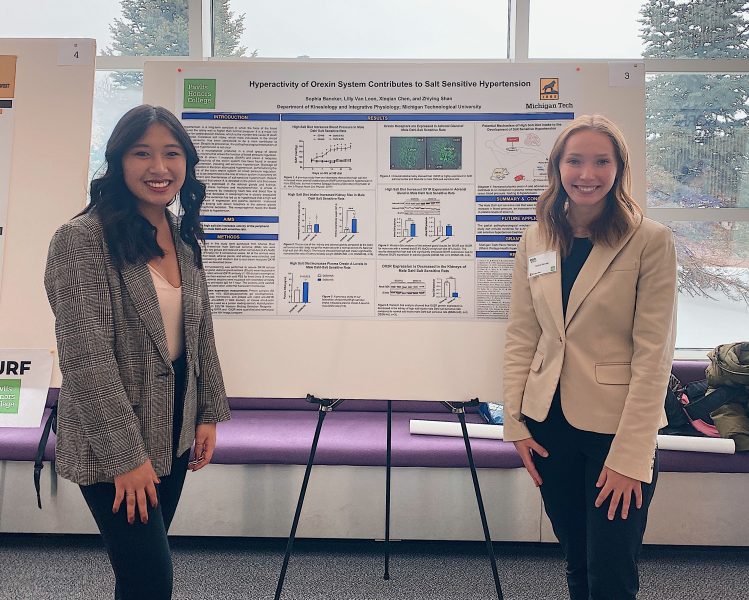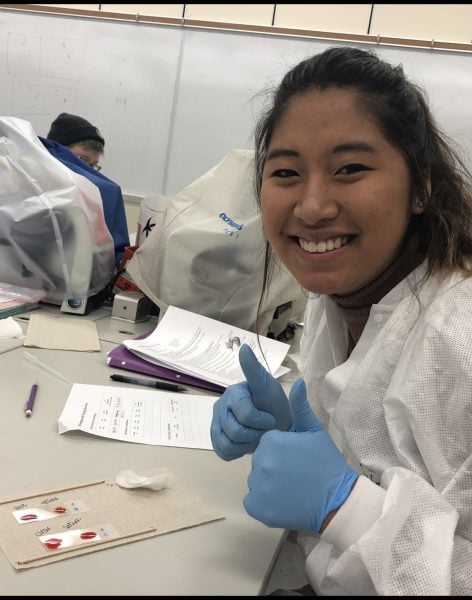Shadowing physicians at Dickinson County Hospital was a favorite past-time for Lilly Van Loon ’22. She experienced the hospital: the ER, pediatrics, physical therapy, social work. A career in medicine appealed to Lilly. The pre-health program at Michigan Tech was her choice to begin a journey to medical school. However, she soon realized she did not enjoy the pre-med journey. Maybe it was not the right destination for her.
But a visit from Karyn Fay, former program director of medical lab science, to her classroom was the redirect she needed. She took the next exit and headed straight to medical lab science (MLS). She loved the analytical nature of MLS. It had process, order and fine detail to master. As she has found, “When you get a sample, you have to problem-solve. You get to help with the diagnosis of the patient. You work independently but you get to collaborate with others.” Lilly enjoyed learning about the different panels, gaining expertise. She knew she was headed in the right direction.
Undergraduate research is a key factor in choosing Michigan Tech
Working in research as an undergraduate was an important factor in selecting Michigan Tech in 2018. She knew she wanted to take part in research. Research came up during an early conversation with an advisor in biological science. Experiential learning from research would increase her knowledge level and round out her resume. She mastered skills like pipetting in the lab. She gained a deeper understanding of different tests and techniques. The repetition gave her confidence. The lab has been an important part of her journey.
Investigating the impact of high salt diets
Lilly’s lab in the Kinesiology and Integrative Physiology department focuses on “The Role of Orexin A in Salt Sensitive Hypertension”. Lilly says “Hypertension is a major risk factor of cardiovascular disease, which is the number one cause of death in the US. There are many mechanisms that contribute to hypertension, and hyperactivity of orexin signaling is one of them. Our goal is to see if a high salt diet increases activity of peripheral orexin in Dahl-Salt Sensitive rats. Also, if there is a difference in the expression of orexin between male and female rats. This is super interesting because this condition is so common in the US, and I am excited to understand more about the physiology.”
“Lilly joined our lab in 2020 and learned molecular techniques. She also did animal study including taking care of rats and measuring blood pressure by using a noninvasive tail cuff method. Blood pressure was measured once a week and Lilly seldom missed the measurements,” says Dr. Zhiying (Jenny) Shan, associate professor, kinesiology and integrative physiology. “In our lab we never had blood pressure data of Dahl salt sensitive female rats and Lilly helped us collect this data which fulfills our research. Besides animal work, Lilly dedicated a lot of her time in molecular-based research and worked hard from last summer till now. The PCR and Western blot data that she collected was useful for our future study and will be present in our future publications.”
Lilly sees the benefits of research
Lilly knows the benefits of research for society. She says, “We can identify the limits and strive to learn more…. Without that curiosity and research, our society would remain stagnant and would miss out on a lot of amazing innovations.”
Personally, her research helped her manage time. She loved the research, but it was time consuming. Lilly estimates she committed 10 hours per week as a lab assistant in her sophomore and junior years, and increased it to 15-20 hours per week as a senior. She admits, “You forget this is an extracurricular thing. There’s so much to consider. Balancing research and school work, your mental and physical health, and social life. Thanks to my research I’ve been able to grow my skills in managing time.”
Dr Jenny agrees. “I think Lilly is also a self-disciplined person. Besides research, she has a lot of coursework and a job, but she can handle multiple tasks very well which definitely is due to her discipline and initiative. In addition, Lilly learned things fast, so I really like to work with her, and this is another reason that makes her successful in our lab.”
Lilly receives Undergraduate Research Internship Program grant at Michigan Tech
Receiving an Undergraduate Research Internship Program grant proved exciting. Awards of up to $1,600 are available to all Tech undergraduates interested in engaging in a research experience in a faculty member’s laboratory. It took a lot of time, sweat and tears to apply for that grant. But it paid off in the end. Her one word to describe the experience: rewarding.
Award recipients are required to present their research at the annual Undergraduate Research Symposium. She accomplished this in March on Friday of Preview Day Weekend with her poster “The Role of Orexin A in Salt Sensitive Hypertension”.

Lilly finds community at Michigan Tech
Lilly found the MLS program to be a tight-knit community where students helped each other. The student chapter of the Society of Medical Lab Scientists (SMLS) was a big part of the community. Lilly was responsible for public relations for SMLS. “SMLS has given me so much. I met some of my best friends through it. They will be in my life forever. You do study groups. It’s a great opportunity as an underclassman. You get advice from upperclassmen. As an upperclassman I get to return the favor. They are a great support system. We help each other with registration and studying, getting over the stress of school. We do the blood drive too.”
In looking back at her time at Michigan Tech, she says “This is a place I think you can thrive. I see all my friends, even from different majors, and many are thriving. I don’t think everyone can make it here, but big props to you if you can make it here.” She loves the community at Michigan Tech. “Everyone here welcomes you with open arms. Everyone is so open and friendly, especially in this major. People I met here in my first week are still some of my best friends.”
What’s next?
For Lilly college was always on the radar. She looked forward to exploring interests in science and preparing for that career in medicine. And now she is closer to the destination, with a practicum at Marshfield Clinic this summer as her next stop. Lilly beams when discussion turns to Marshfield Clinic. “There will be cool tests. Because Marshfield Clinic is so well known and brings in patients from all over, there will be things you don’t see every day. I will have three months in the classroom and then 6 months in the lab. Students that have gone through there have done well on their BOC (certification exams) and I am lucky to be one of those people to be a part of it. They have a 100% passing rate for their students.”
Of course, having great students like Lilly in their practicum keeps that passing rate high. Claire Danielson, medical laboratory science program director and academic advisor says “Lilly is a joy to have in the classroom and lights any room she enters! Her positive attitude and strong laboratory skills are going to make her an excellent Medical Laboratory Scientist. We have no doubt that Lilly will make us proud during her practicum at Marshfield Clinic!”
Once she is BOC certificated Lilly will continue her career as a medical lab scientist. She hopes to find a specialization and become a lead technician. Beyond that, she does not rule out returning to school for a masters. Pathology school to become a pathology assistant or entering public health are other options. Lots of exciting stops ahead on Lilly’s journey!



